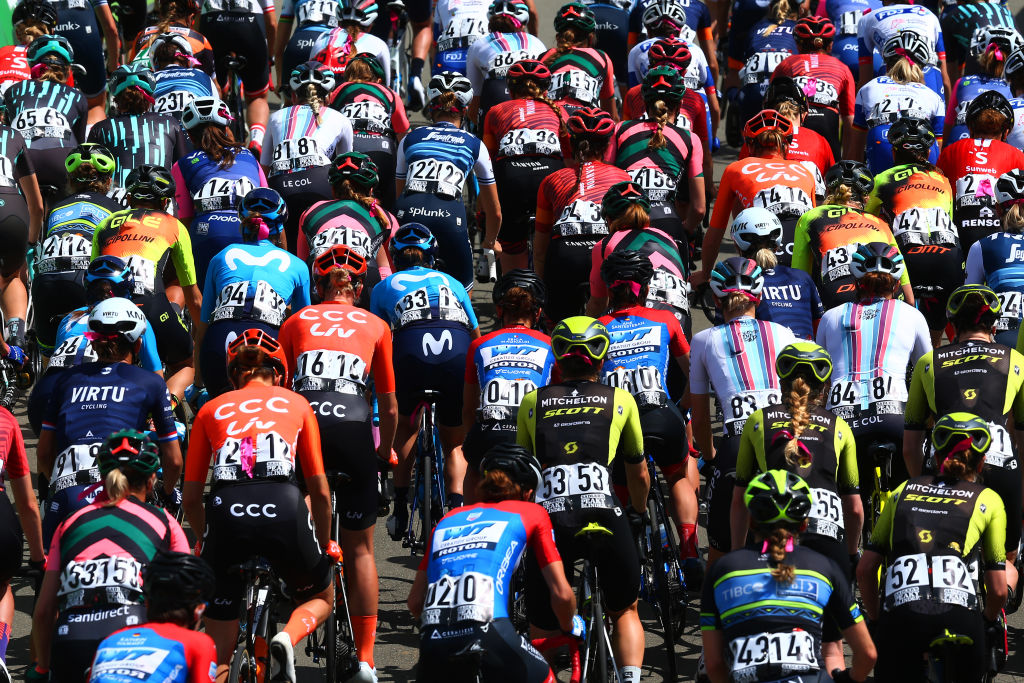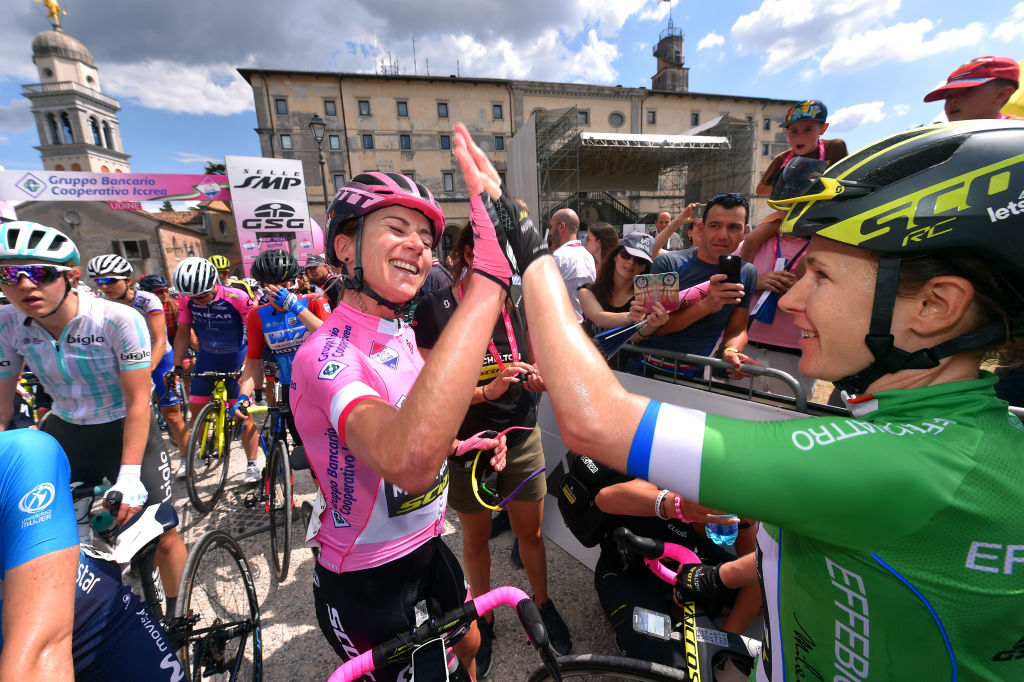The first year: 10 tips for life as a neo-pro
Former pro Kathryn Bertine shares her insights on what women should expect after signing their first contract

Kathryn Bertine is a retired pro cyclist, author, activist, keynote speaker, director of Half the Road & founder of Homestretch Foundation. Learn more at www.kathrynbertine.com.
A young woman recently signed her first UCI team contract (with a foreign team) and reached out to me, asking, "What should I expect to be prepared for next year?"
Great question!
Cycling is a tough sport in all regards. Learning the ropes is usually based on the education model of trial-by-fire. Signing a UCI pro contract means you already know how to race a bike, but there's no set of instructions on what to expect off the bike.
Below are 10 things I wish I knew heading into my first year of professional cycling.
I highly encourage all fellow UCI pro cyclists to share constructive words of wisdom in the comments. Knowledge is power. Let's help educate all new UCI pros so we can build a stronger, safer sport together.
1. Let's start with the good stuff
Expect a life-changing array of incredible opportunities, experiences and travel. You will have an amazing, unforgettable life journey.
Get The Leadout Newsletter
The latest race content, interviews, features, reviews and expert buying guides, direct to your inbox!
Ok, now let's get real… not all of it will be good. You need to be prepared for the bumpy parts of the road.
2. Expect disorganization
As much as we want to believe that Women's WorldTour and Pro Continental teams' directors and staff have their (expletive) together, many of them do not.
Top 'directeurs sportifs' will often give each athlete a three-month plan, so athletes can plan their training and racing schedules accordingly. Other DS's take the approach of letting athletes know where they'll be racing at the very last minute, and athletes will arrive at a race on some middle-seat, three-connection red-eye flight and you'll be expected to be thrilled about it. And that's just one example.
When it comes down to successful pro cycling teams, organization often separates the best from the rest.
3. Join The Cyclists Alliance (TCA)
Know your rights. Educate yourself on what is/isn't acceptable from team management and learn the UCI rules on everything from contracts to codes of conduct. For example, when my WorldTour team director did not race me for four months, it was clear he was playing favorites, but I did not know this was a breach of contract.
Under UCI Rules and Regulations Article 8.C, 'serious misconduct' by the team/manager/DS includes not allowing an athlete to race in five consecutive races which the team attends, and "failure to permit the rider, despite their repeated requests, to participate in competitions over a continuous period in excess of six weeks."
If your director is not racing you at least once every four to six weeks, be vocal. Ask repeatedly to be raced - by email and text, so you have a paper trail of proof. If they still don't race you, take action.
Joining The Cyclists Alliance (TCA) will help. In other sports, many pro athletes have personal agents or managers. This is rare in pro cycling, especially in the early years. TCA, created by former and current pro cyclists, is the closest thing the women's pro peloton has to a union. Don't wait til there's trouble! Support them now so they can support you in the future.
4. Adjust your perspective
As a first-year pro, I thought I'd be going to all the big races of my biggest dreams, because now I'm a pro and that's how it works!
Nope. Hold on, cowgirl.
If you're on a UCI team, you'll probably have 10-14 teammates. Only six race each event. You're not going to be at every race. So treat each race like World Championships and embrace being there.
5. Be a good teammate
Individual results are important, but here's the secret of pro cycling: those who are good teammates stay in the sport much longer than those who aren't.
Talent isn't enough. Reputation goes a long way. I've seen some incredibly talented athletes hop from team to team and struggle finding contracts because their talent and their teammateship are polar opposites. If your DS tells you to win, then go try to win. If your DS designates you a domestique, check your victory ego at the door and be a damn good domestique.
You wanna stick around in this sport of pro cycling? Be. A. Good. Teammate.

6. Personalities galore
Don't expect your team to be a homogenized group of similar personalities. Every team I've been on, both domestic and international, has had a plethora of fascinating personas.
Endurance sports will always cater to Type A, driven, motivated folks who tango back and forth over of the Weirdo border. Don't run. Embrace 'em. Extroverts, introverts, this-troverts and that-troverts make this sport thrive. You don't have to be best friends with your teammates. But you do have to respect one another if you want to even consider succeeding.
7. Health insurance
If you're racing for any team - especially a foreign team - make sure your contract explains what will happen if you get injured, who is responsible for what costs, etc. When it comes to crashing, injury, illness, etc…DO NOT assume that what happens in your country will be the same as other countries.
Trust me on this. I broke five bones in my professional career, including my skull, in foreign countries. Please have this discussion with your DS and/or team owner before you sign the dotted line.
8. Bait n' switcheroo
If you've already officially signed your first pro contract, congrats! Now keep this in mind when it comes to re-signing or signing with a new team: always ask for a management-signed contract first, then you countersign.
Here's why. Once upon a time, I was offered a contract with a WorldTour team which I eagerly signed and committed to in early December. They said they would announce my selection to the team at the end of December. I was so excited! And so naïve!
While visions of sugarplums danced in my head, the Grinch was silently in action. The team director had my signature, but never sent back the countersigned document with their signature. On December 31, they dropped me, having shopped around for a 'better' rider. By that time, every other pro cycling team was full. Thinking that was a fluke experience, and other teams would surely not play such games with countersignatures and contracts, it happened twice more (I'm a slow learner).
So learn from my mistakes. Ask for your contract to be signed first by the team, or at the very least, negotiate your contract to include that it will be returned and countersigned within 48 hours.
9. Take action against abuses
If your manager, director, team owner, soigneur, mechanic or other staff member ever subjects you to emotional, physical or sexual abuse - or 'grooms' you to trust their position of influence/power - please know you can and should take action.
You are not alone. This happens in our beloved, beautiful, wonderful sport of cycling and far too often and is kept quiet because athletes feel helpless, manipulated or unsure what path to take. Women between 18-22 run a high risk of being 'groomed' by predators. Keep your eyes open, not just for yourself, but your teammates. Together we can work to end predatory behavior, and destigmatize talking about sexual misconduct and emotional abuse. The Cyclists Alliance can help. SafeSport in the US can help. If you want to reach out to me, I will do my best to help point you in the right direction.
Change will only happen in this sport if we stand up and speak out when something is not right. No one messes with the sisterhood of pro cycling.
10. Ask, Ask, Ask
The most important thing an athlete can do in their first season of racing professionally is ask mentors and teammates for help and guidance along the way. Asking is a sign of strength and progress.
Seek out the person on your team who's been around the longest. Ask questions. Reach out to retired pros, ask them, too. Ask your current teammates, competitors and colleagues for advice and insight. They might not have all the answers, but it's amazing what the doors of communication will open. A few years from now, you might be the person who passes their knowledge to the next new pro cyclist. That education starts now, by asking questions. Have an amazing journey living the answers.
May the good experiences outweigh the bad and may the wind be at your back. Congrats on your first pro team!